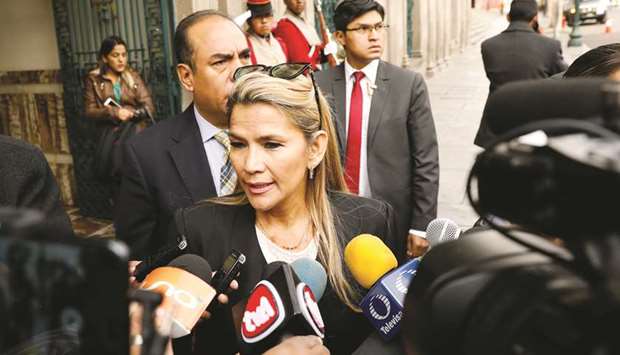Interim President Jeanine Anez yesterday moved to consolidate power in deeply polarised Bolivia, winning recognition from the United States and Russia, immediately shifting the country’s foreign policy on erstwhile ally Venezuela.
Anez is expected to complete her government line-up soon, having named new military chiefs and half of her proposed 20-member cabinet — including Defence Minister Fernando Lopez Julio — the night before.
“We have come to pacify the country,” Lopez Julio said in a speech at the military college in La Paz.
“Above all, we will have to have faith in God,” he said, highlighting the conservative Christian emphasis of the new government after Anez had set the tone by brandishing a Bible when she assumed office on Tuesday.
Anez swore herself in as president on Tuesday after Morales fled the country, fearing for his safety amid deadly protests.
Unrest erupted when he was accused of rigging the results of October 20 polls to gain re-election for a fourth term.
Normal business resumed in the main cities after weeks of deadly protests, but schools and universities remained shut due to the continued threat of demonstrations.
Many gas stations remained closed because of a lack of supplies.
Nearly a month of protests have left 10 people dead and nearly 400 injured.
Morales supporters yesterday launched fresh protests, marching toward government headquarters in La Paz.
Riot police had clashed with hundreds of Morales supporters the night before during a demonstration against Anez, who Morales accused of carrying out a “coup.”
Morales has kept up attacks on the new government via Twitter from his exile in Mexico.
Anez told reporters yesterday that new Foreign Minister Karen Longari would “make representations” to Mexico to insist that Morales be held to the terms of his political asylum.
Morales’s Movement for Socialism (MAS) party yesterday accused her of “continuing to incite violence” in the country, which has been in turmoil since Morales’s contested re-election.
She wasn’t helped by her Interior Minister Arturo Murillo, who announced the government would “hunt down” a former Morales minister, Juan Ramon Quintana, accused of masterminding opposition to Anez.
Quintana “is an animal that feeds off blood,” said Murillo, while Anez has publicly insisted there would be no persecution of Morales’s inner circle.
The 52-year-old interim leader yesterday gave the first indication of her government’s foreign policy, recognising Venezuelan opposition leader Juan Guaido as his country’s president, a key shift of alliance in the volatile region.
The announcement removes one of Venezuelan President Nicolas Maduro’s main allies as he fends off efforts to oust him amid a deadly economic and political crisis.
Anez’s decision signals a significant break from socialist leader Morales’s position on Maduro.
Her government decided to formally recognise Guaido “from this moment on,” Communications Minister Roxana Lizarraga told reporters.
Meanwhile, United Nations chief Antonio Guterres yesterday dispatched a special envoy to Bolivia amid unrest in the South American country.
“The Secretary-General has asked Mr Jean Arnault to engage, as his personal envoy, with all Bolivian actors and offer United Nations support in efforts to find a peaceful resolution to the crisis, including through transparent, inclusive and credible elections,” spokesperson Stephane Dujarric told reporters in New York.
Arnault has previously served as special representative for Colombia, Georgia and Afghanistan.
Guterres “remains deeply concerned about developments” in the country and “reiterates his appeal to all Bolivians to refrain from violence and exercise utmost restraint,” Dujarric said.
Separately, Russia yesterday recognised Anez as acting president of Bolivia.
“We have taken note of the announcement that the second deputy speaker of the Senate, Mrs Anez, has taken office as interim president,” foreign ministry spokeswoman Maria Zakharova said in Moscow.
“It is clear that it is she who will be considered the leader of Bolivia until a new president is elected,” deputy foreign minister Sergei Ryabkov told RIA Novosti state news agency.
Zakharova added that these statements did not change Russia’s official position on events in La Paz which Moscow has called a coup d’Etat.
“This is not about recognising what has happened in Bolivia as a legitimate process,” she said.
“We condemn in principle any recourse to violent methods to settle political issues,” Zakharova added.
The situation in Bolivia “remains tense and there is a risk of further complications. Bolivia needs calm, peaceful dialogue”.

Bolivia’s Interim President Jeanine Anez talks to the media outside the Presidential Palace in La Paz yesterday morning.
